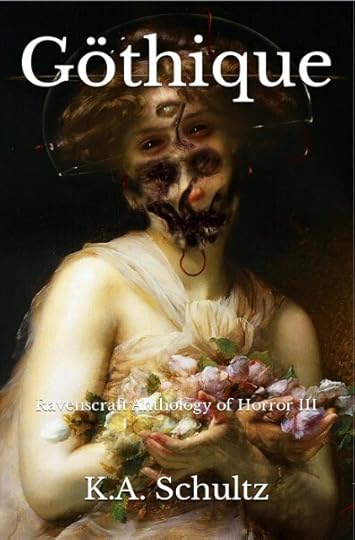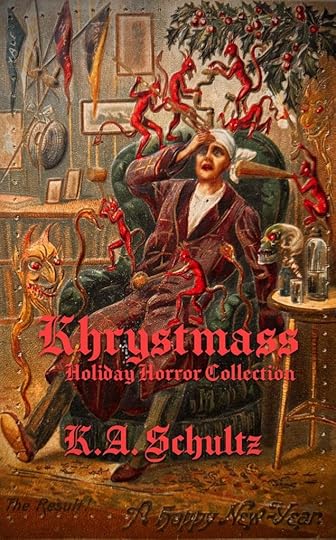REVIEW AND INTERVIEW: K.A. Schultz on her new books, GÖTHIQUE and KHRYSTMASS

The words, “If you love the horrific lyrically delivered, this book is for you” were used to describe K.A. Schultz’s GÖTHIQUE, a late 2023 collection of prose and poetry that leans into the macabre the way a killer stalks their victims on a quiet night, silently at first, just out of sight, until the inevitable occurs and the hammer of horror drops. K.A. Schultz wields words the way Gandalf exudes magic, with both subtle nuance and thundering force. Anyone who loves short creeps and chills, and phrases tuned to exactness, or lyrically and horrifically delivered, Schultz is your author. The stories within this collection pay homage to classic tales of the macabre and, Like Doctor Frankenstein’s cadaverous creation, breathe into them new, splendidly chilling life.
Find GÖTHIQUE here.
 Göthique: Ravenscraft Anthology of Horror III
Göthique: Ravenscraft Anthology of Horror IIIDakeha Taunus LLC (November 1, 2023)
Of course, GÖTHIQUE isn’t the author’s only recent contribution to the literary world. While it may be perfect for Halloween and every other spooky week of the year, the author’s 2024 release, KHRYSTMASS, brings the darkness Schultz is known for right to the holiday party. We’re all familiar with some of the classics of the fall and winter season; Shelley’s Frankenstein, A Christmas Carol by Dickens, and more, but many have often wondered what comes next in these stories? Schultz has an answer for you within these engaging, harrowing pages.
Find KHRYSTMASS here.
 KHRYSTMASS
KHRYSTMASS Dakeha Taunus LLC (August 4, 2024)
I got a chance to chat with the author upon the release of her two newest titles. Read the interview below!
Whitehurst: Let’s start with the first of two books we’ll be covering; GÖTHIQUE. It’s a collection of stories by “the late Lilah Ravenscraft.” Tell me about this collection.
Schultz: It’s the second (2023) of three short story collections I have published now. Horror short stories, with some flash fiction (i.e., 100-word pieces – such fun lit exercises!) and poetry in each one as well. The “late, great” Lilah Ravenscraft’s story is found in NEITHERIUM, my 2022 collection. Her untimely demise is due to a Faustian deal-with-the-devil she made, may she rest in peace… GÖTHIQUE consists of short stories she curated, but never was able to publish, which I have now done under the auspices of Dakeha Taunus LLC, my publishing entity. This plus many other literary and even tech bits and pieces connect all three books to each other, although every work in them can exist as a stand-alone story. I have content guides at my lit site http://www.butterflybroth.com for all books, the idea being to facilitate ez selection of stories to read, and to provide general content warnings as well.
Whitehurst: What can you tell us about Lilah?
Schultz: Lilah’s story in NEITHERIUM is called “Ravenscrafted.” It tells of her early evolution as a writer, and a publisher, and relays her otherworldly experience with a mysterious demonic/magical being, which materializes in her room and leads her in a ritualistic pact signing – a classic trope – fame and fortune for her, but at a price. My newest book, KHRYSTMASS, now also features a story about Lilah in her earliest days, before she even adapted the name and persona by which she was so well known later on. That one is called “Bell Ringer Number One.”
 K.A. Schultz
K.A. SchultzWhitehurst: The last time we chatted you had just released ANATHELOGIUM, and you explained the meaning behind the word. Care to share your insight on the meaning of GÖTHIQUE?
SCHULTZ: GÖTHIQUE is intended to be illustrative of the gothic leanings of this collection: classic horror and dark aesthetic tropes that (also) go back in time, which are also decidedly Brontëesque, if you will, in vibe: time, place, mood. All the works, btw, in ANATHELOGIUM were absorbed into NEITHERIUM, freshly re-edited.
Whitehurst: In the book you used classic fairy tales, such as your story Penchants of the Prize, and spun them into horrific corners. What led you down these paths?
Schultz: I love classic fairy tales and folklore, most particularly European/German originating, being that is my cultural and linguistic background as a first generation American. I have always delighted in the organically dark and dramatic of Germanic lit like this, and as horror writer find it rich fodder for inspiration and exploration. “Penchants of the Prize” digs into extreme concepts behind the envy of the stepsisters as juxtaposed to Cinderella’s virtuous embodiment, with the big twist being founded on the prince – the Prize – and the so-called “happily ever after,” which has been the classic presumption. It is also a nod to Ann Rice’s work as A.N. Roquelaure, her original Sleeping Beauty series.
Whitehurst: Tell me about your Christmas book, Khrystmass: Holiday Horror Collection?
Schultz: This is my new collection, just published in August. It was a *joy* to write! A few short stories were carried forward from the two previous books, them being Christmas or deep winter-leaning, as was an excerpt from JACOB A DENOUEMENT IN ONE ACT added to the mix. These holiday/winter/Christmas/Dickensian motifs are all great favorites of mine.
Whitehurst: Do you have a favorite Christmas memory?
Schultz: It could well be that my favorite memory is quite a new one: my daughter, now a junior in college, won a spot as one of three Christkinds at the Carmel Indiana Christkindlmarkt, back when she was a junior in high school. She worked several shifts at the Christmas market in full Christkind dress, which was an absolutely magical experience. It was also my mother’s last Christmas before she passed, and so for my mother to join us at the market, to first help my daughter dress in her glowing, angelic costume in preparation for her shift, and then to watch her interact with market goers, was a total highpoint for her, and for me as parent and daughter. The experience was really that of a magical transformation!
Whitehurst: In Khrystmass, you reference classic literature such as Mary Shelley’s Frankenstein and A Christmas Carol by Charles Dickens. What do you think makes their popularity so timeless?
Schultz: They hold truths that are timeless and universal. Frankenstein is so about loss and rejection, about unrequited love, and devotion, and then all the rage that is spawned in its face. It is about the ills and issues of medical/scientific capabilities and experiments that exist beyond humankind’s wisdom to mete it out in its best possible ways. It is about usurping paradigms of what Man perceives as beauty and acceptability, how the monsters are not necessarily the beings that cause the most damage. Dickens explores much of this in his many works; A Christmas Carol most especially in my context as a horror writer is that it is the grandaddy of sci-fi: time travel/ intra-dimensional existence/ alternate realms of existence and it has who are the most famous, best-loved, and in Jacob Marley’s case, the most lamentable ghosts ever. I also, for all the issues that come with the pervasiveness of commercialized/materialistic holiday celebration, am a great believer in what Ebenezer Scrooge’s nephew claimed as his Christmas celebratory mantra: (I’ll paraphrase) even if it never puts gold into one’s pocket, if it can manage to bring people together in the name of good cheer, it is a good thing and worth holding onto.
Whitehurst: Any personal favorites from the collection?
Schultz: In KHRYSTMASS, I would say “Turn the Lights to Party” and “Stille Nacht” (Silent Night) are nearest to my heart. “Lights” is a direct homage to my daughter and how she has Alexa set our lamplight in multi-color arrays, and it is about the undying love one has for their child. “Stille Nacht” is the manifestation of a story I have had in my heart and head for ages. I researched it thoroughly and enjoyed the creative calm before the storm while my subconscious was working out the approach to the story – it took a while to get to the point of writing it, but when I did, the story seemed to write itself. I write of many things in history and nature that I love in that story, and I use them as spiritual, universe-tapping incidents the Creature experienced. For, you see, in my story, the Creature (Frankenstein’s creation had no name) lived on into modern times. It is the rest of his story.
Whitehurst: Would you share some tidbits into your writing process? How did you decide the arrangement for your stories for instance?
Schultz: They are chronologically placed into the collections, but their placement is also very reliant on a chronology that would establish itself, were the reader to read the three books in order, front to back. There are many literary and tech-based Easter eggs in the books.
The writing process: I love technology for its easy ability to log ideas and to file them. Just as anyone would have idea folders and pages of notes and ideas, or snippets of dialogue or narrative that occur to one, so do I keep all of that electronically, to refer back to it, and to tap it, mix it and blend it as needed, as the writing process might evolve from any of it. When I write, I write quickly and for long spells – it is a hyper-introspective, solitary state of being I relish, but which is not ideal for pets and family lol. I have even explored and written on the creative process, as that in and of itself fascinates me. The article is an older Huffington Post piece, easily accessed via my link tree, called, “On Creativity: Endocepts and Exocepts.”
Whitehurst: Khrystmass has a very memorable cover which you wrote is a German postcard. Care to shed some light on it?
Schultz: It is a totally meant-to-be eBay find! The moment I saw it, I knew that postcard was IT. Seventy dollars very well spent! A late 1800s German postcard, which I own, so the image is freely mine to use. The red critter-elves even found their way into my foray into splatter punk fun, entitled, “Krampuss,” and the image is likewise uncannily illustrative of my two Santa Domnia (Saint Everything) stories, in particular of the troubled, obsessive author-wannabe who conjures forth the dark and wicked Saint from her ancient grave…
Thank you for visiting the page! Learn more about K.A. Schultz here.



